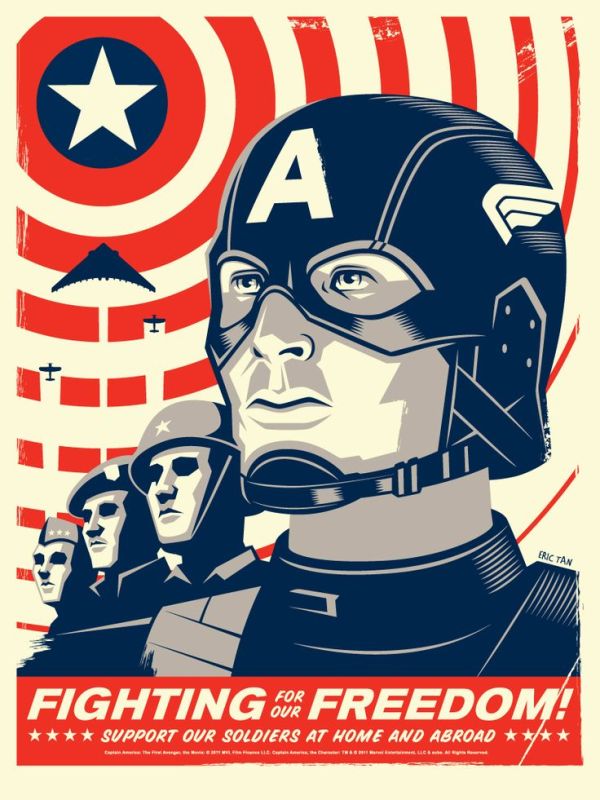 BY JAMES M. DAVIS “Enhanced Individuals,” we hear in a newscast at the beginning of Captain America: Civil War, need to be brought into check. At first glance this phrase does what is intended, it deprives superheroes of being both “super” and “heroes.” This is a world where masked super-people have (accidentally) killed innocent people in operations unapproved by any governmental body. Through this phrase we are brought into a world where the Avengers are being asked to sign an accord with the UN which would essentially turn them into a peacekeeping force at the beck and call of the powers that be.
BY JAMES M. DAVIS “Enhanced Individuals,” we hear in a newscast at the beginning of Captain America: Civil War, need to be brought into check. At first glance this phrase does what is intended, it deprives superheroes of being both “super” and “heroes.” This is a world where masked super-people have (accidentally) killed innocent people in operations unapproved by any governmental body. Through this phrase we are brought into a world where the Avengers are being asked to sign an accord with the UN which would essentially turn them into a peacekeeping force at the beck and call of the powers that be.
However, what this phrase also brings up is essentially a corporate-speak interpretation of the inherent fantasy of the superhero. It is the quintessentially American Lone Ranger dream of the rugged individual, unbound by society or convention, the man who becomes the perfect image of spectacular freedom. In films this freedom can come from a any number of devices, a horse and a gun, incredible riches, a motorcycle, the ability to shoot laser-beams out of your eyes, what have you. At any rate this freedom almost always comes saddled with a morality outside of the mainstream, a set of values (or lack thereof) which gives the individual a much greater range of action. Because sometimes superheroes have to destroy the village to save it.
What Captain America represents in this film is exactly that notion of freedom, which can not be tied down by any governing principle, no matter how right minded or egalitarian. What’s more, this idea is being sold by the living avatar of American-ness, Captain America. To quote David Foster Wallace, one of the best writers on this phenomena in America:
There is a particular ethos in US culture especially in entertainment and marketing culture which appeals to people as individuals- that you don’t have to be devoted or subservient to anything else. There is no larger good than your own good and your own happiness […] I think this is a very American idea that YOU are the most important, what you want is the most important and that your job in life is to gratify your own desires. That’s a little crude to say it that way but in fact it’s something of the the ideology here, and it’s certainly the ideology that’s perpetrated by television and advertising and entertainment. The economy thrives off it. ( ZDF. Germany, Nov. 2003. Television.)
It is telling that in Captain America: Civil War, Tony Stark, the voice of reason insisting that the Avengers sign the accord and surrender their free will to behave super-heroically as they see fit, is first shown early in the movie wearing a Mister Softee t-shirt. His girlfriend has left him and he’s just kind of sad and neutered. This leaves Captain America as his opposite number. Captain America kisses a girl. Captain America doesn’t think much of Tony’s fancy set of treaty signing fountain pens. Captain America goes to his Aunt Peggy’s funeral, and in a moment Ted Cruz would be proud of, remains in the church long after everyone else has gone home, finding the inner strength to remain unbound by international law. And so the movie plays out generally along these lines, Tony Stark putting together a superhero posse, Cap putting together an opposing posse, and the two basically just fighting each other for the better part of two hours.
The problem here should be obvious: Captain America is basically GW back in ’02 saying “Security Council Shmecurity Council” and disastrously putting cowboy boots on the ground in Iraq, or conducting deadly drone strikes of dubious legality in a sovereign nation like Pakistan. It’s a pro-world police argument and essentially the opposite of what Cap was saying in his last flick, which saw him basically do a Snowden on SHIELD, taking out what was the closest thing to an actual world police in his universe.
With Trumpism becoming such a genuinely large and scary voice in America, this is the wrong time for Captain America to suddenly be changing tack in terms of his ideology. Trump certainly would root for Steve Rogers wholeheartedly throughout the film. We don’t need no stinkin European treaties – just All-American Kick-Ass! What’s more disturbing, and drives this point home even further is the ending ::SPOILER ALERT:: which sees Rogers leaves behind his shield, the totemic symbol of his American-ness as the true source of his powers. He is rejecting Stark’s futurist, global America, an America where we are but one player on a vast and interconnected stage, in favor of retreating with his childhood friend into the shadows of non-statehood. That is, the film shows two visions of America, and in the final analysis finds them irreconcilable. “Make America Great Again” has always been about returning to some golden era that never was, and it is this long lost and unrecoverable epoch that Captain America is retreating to and soon enough he will find — as will millions of unapologeticfally racist Trump voters — that there is no long any there there. In fact, there never was.

